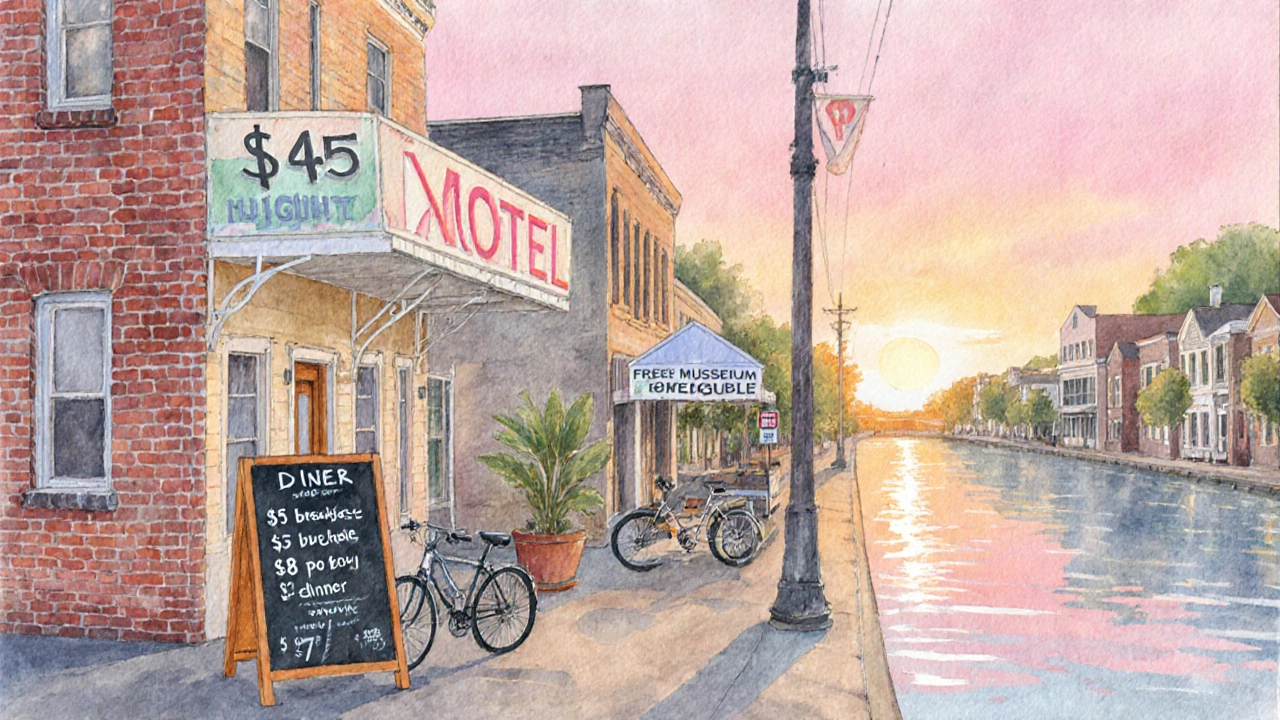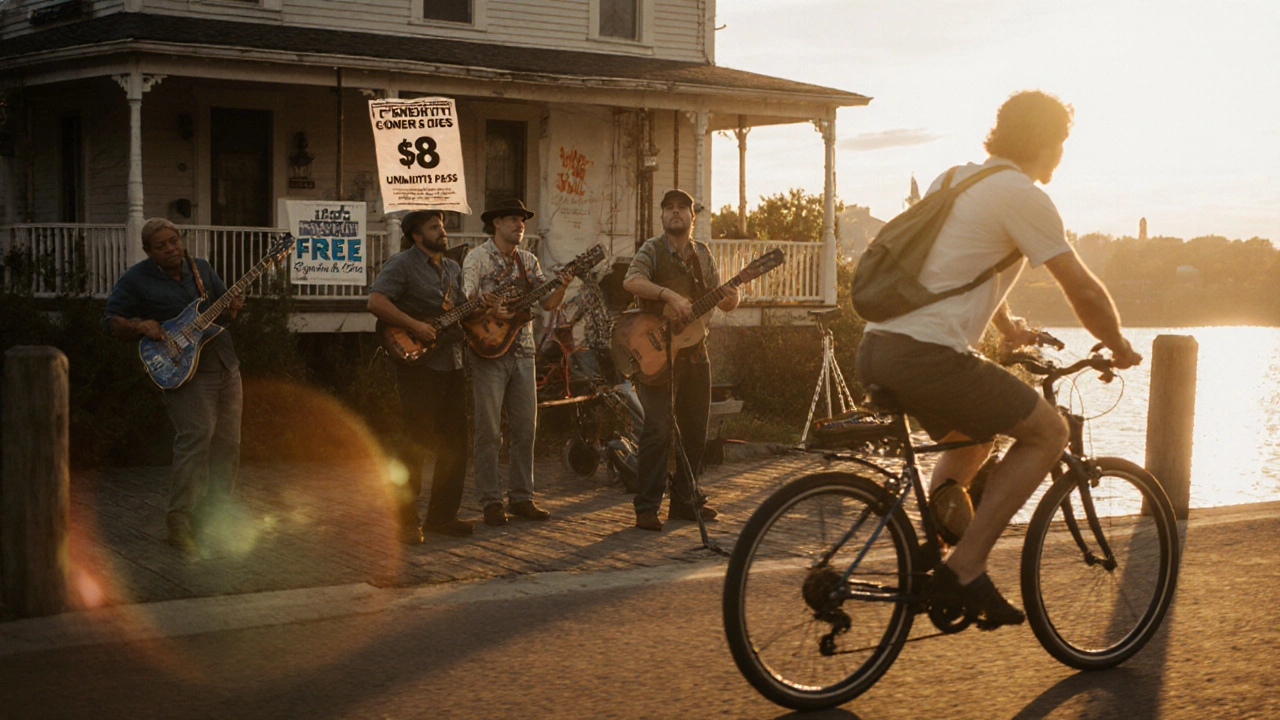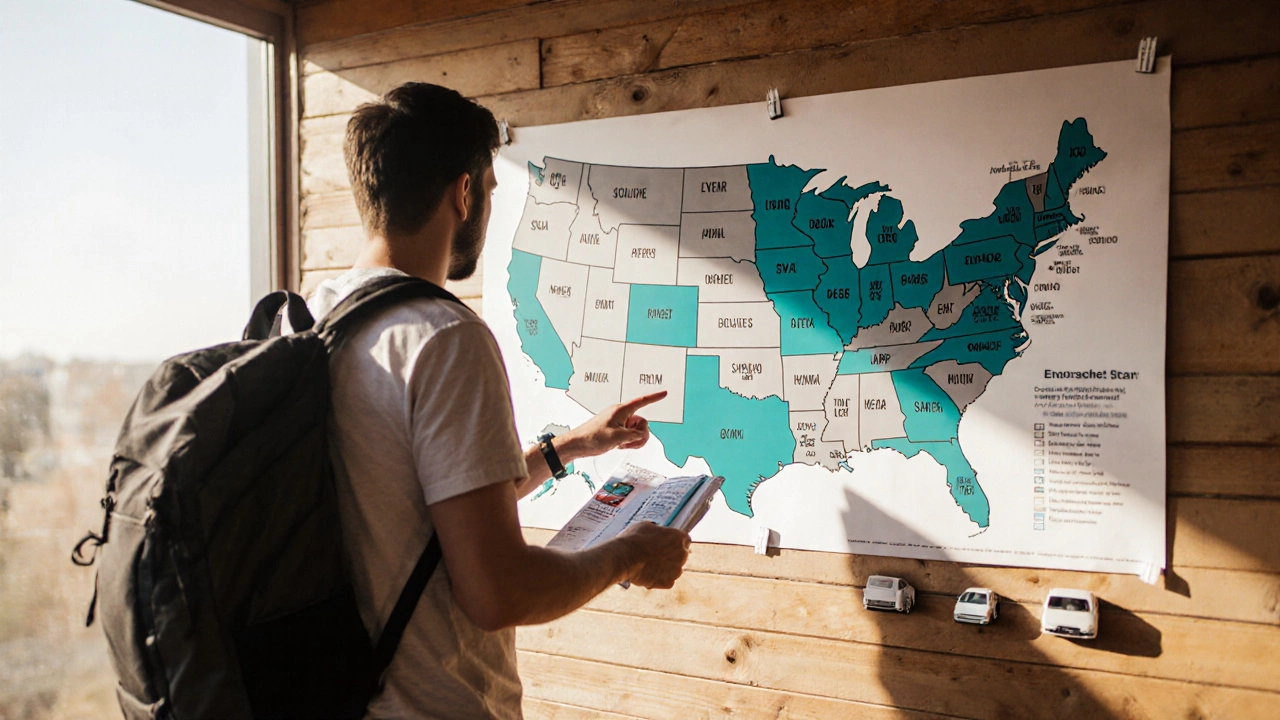Budget Travel Calculator
Calculate Your Travel Costs
Accommodation: $0 for 0 days
Food: $0 for 0 days
Transportation: $0 for 0 days
Total Cost: $0
Per person: $0
Looking for a U.S. getaway that won’t drain your wallet? You don’t need to fly overseas or stay in a five‑star resort to keep costs low. By targeting the state where everyday expenses-lodging, meals, transport and attractions-are at their lowest, you can stretch every dollar and still have a memorable trip. Below you’ll find the state that currently tops the affordability chart, how the numbers break down, and a quick‑look comparison with other budget‑friendly options.
Quick Takeaways
- Mississippi averages under $85 per day for a solo traveler in 2025.
- Accommodation costs hover around $45, food $25, and transportation $15.
- Nearby states like Arkansas and West Virginia stay close but are a few dollars higher.
- Travel off‑season, use local diners, and stay in boutique B&Bs to keep the budget tight.
- Public‑transport passes and free outdoor attractions make the savings even bigger.
How We Measure "Least Expensive"
To avoid vague claims we based the ranking on three concrete metrics gathered from the latest 2024‑2025 travel surveys, hospitality reports, and state tourism boards:
- Accommodation - average nightly price for a mid‑range hotel or a private‑room Airbnb.
- Food - daily budget for three meals at local restaurants or grocery‑store meals.
- Transportation - cost of renting a compact car for a day or using public transit passes.
We added a fourth factor, Travel cost - a weighted average of the three categories plus typical entrance fees for popular attractions. All figures are in US dollars and represent a solo traveler; families will see higher absolute numbers but a lower per‑person rate.

The Winner: Mississippi is a southern state with a blend of river towns, blues heritage and low‑cost living.
According to the 2025 Budget Travel Index, Mississippi’s total daily cost sits at $84.70, edging out the competition by roughly $3‑$7 per day. Here’s the detailed breakdown:
- Accommodation: $45 per night - you can find a clean double‑room hotel in Jackson for under $50, or a historic B&B near Natchez for $40.
- Food: $25 - local diners serve a breakfast plate for $5, a po’boy lunch for $8, and a Southern dinner for $12.
- Transportation: $15 - a compact car rental is $30 per day, but splitting the cost with a travel buddy drops the per‑person expense to $15. Alternatively, the Mississippi Coast Transit Pass costs $8 for unlimited rides.
- Attractions: $0‑$5 - many museums in Oxford, the Vicksburg National Military Park, and the Mississippi River Trail are free or ask for a modest donation.
Combine these numbers and you get a realistic budget that lets a traveler enjoy music festivals, river cruises, and plantation tours without breaking the bank.
How Mississippi Beats the Competition
| State | Accommodation | Food | Transportation | Total Daily Cost |
|---|---|---|---|---|
| Mississippi | $45 | $25 | $15 | $84.70 |
| Arkansas | $48 | $27 | $16 | $91.30 |
| West Virginia | $50 | $28 | $17 | $95.00 |
| New Mexico | $52 | $30 | $18 | $100.40 |
Notice that Mississippi’s lodging is the cheapest among the four, and its food prices are also slightly lower. The transportation gap isn’t huge, but the state’s extensive free attractions push the overall cost down.
Practical Tips to Keep Costs Low in Mississippi
- Stay in a guesthouse or a small‑town Airbnb instead of a chain hotel - you’ll save $10‑$15 per night.
- Eat where locals eat. The famous “taco trucks” in Jackson sell meals for $6, and a bowl of gumbo at a family‑run diner is $8.
- Rent a bike in coastal towns like Gulfport; daily bike rentals are $7 and let you skip both gas and parking fees.
- Visit during the shoulder season (April‑May or September‑October). Hotel rates drop 15‑20% and crowds are thin.
- Take advantage of free cultural events - the Mississippi Blues Festival offers free concerts, and many town squares host weekly farmer’s markets with no entry fee.

Common Pitfalls to Avoid
Even the cheapest state can become pricey if you fall into these traps:
- Booking last‑minute rooms in major cities - prices can surge by 40% during festivals.
- Relying on taxis or rideshares for short hops; a simple bus or bike ride is far cheaper.
- Eating at tourist‑centric restaurants near popular landmarks - these often charge double the local rates.
- Skipping a travel pass. A weekly transit pass in the Mississippi Delta costs $30; buying single rides adds up quickly.
What to Do Instead
Plan your itinerary around free attractions such as state parks, historic sites, and community events. Use apps that highlight local happy‑hour deals, and pack a picnic for park lunches - a sandwich and a soda cost less than $5.
Frequently Asked Questions
Which city in Mississippi offers the cheapest accommodation?
Jackson consistently ranks lowest, with budget hotels averaging $45 per night and several downtown hostels under $40.
Are there any free museums or parks in Mississippi?
Yes. The Mississippian Art Museum in Vicksburg and the Natchez Trace Parkway are free. Many historic downtown squares also host free art installations.
How much does a car rental typically cost per day?
A compact car from a major company runs about $30 per day. Booking 2‑3 weeks in advance or using discount codes can shave $5‑$10 off the price.
Is public transportation reliable in the smaller towns?
While big cities like Jackson have regular bus routes, smaller towns rely on shuttle services or shared vans. Checking the local transit website before you travel helps you plan.
What’s the best time of year for a cheap trip?
Late spring (April‑May) and early fall (September‑October) offer mild weather, lower hotel rates and fewer crowds.

Menu